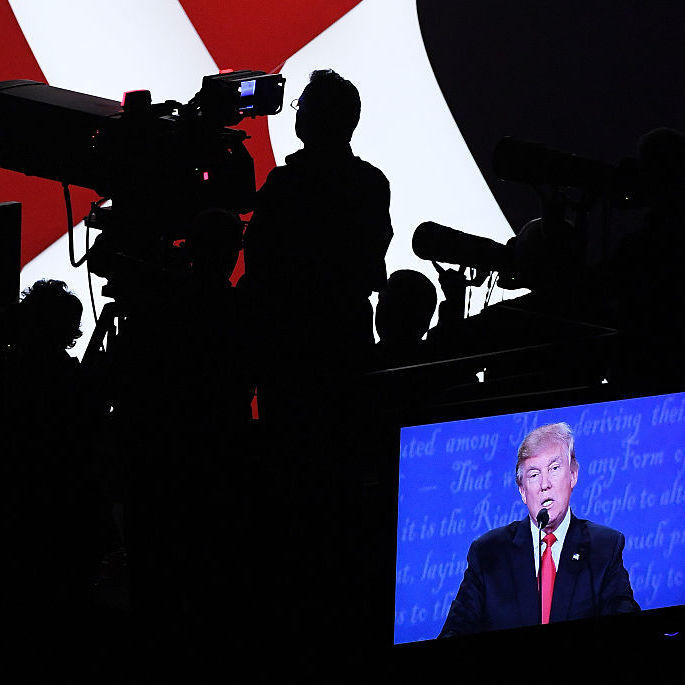Politics
Did A Sort Of 'Trump TV' Just Launch Its Pilot?
In a new Facebook Live show launched Monday night, Donald Trump's campaign painted a rosy picture of the election in just two weeks, with campaign manager Kellyanne Conway even saying "unequivocally" that "we will win."
Her interviewers were two of the GOP nominee's campaign advisers, Boris Epshteyn and Cliff Sims, hosting the inaugural edition of an online show "bypassing the left-wing media," as Epshteyn put it, "which skews everything."
The "nightly campaign coverage" had some of the hallmarks of a newscast. Set for 6:30 p.m. ET each night, running up against network TV news, the campaign will broadcast live from Trump Tower until Election Day. There was a news scroll at the bottom of the newscast, but there was also a button to donate to Trump's campaign. Monday's setting was in the Trump "war room," where a large photo of the real estate mogul hovered behind the anchors' heads as campaign staff meandered around.
The hosts denied that this was some type of "Trump TV," a rumored endeavor from the GOP nominee if he loses to try to monetize his loyal base into a massive media influence akin to Fox News. As NPR media correspondent David Folkenflik has noted, such an an endeavor is easier said than done, even if Trump does have two former conservative media heads, Fox News' Roger Ailes and Breitbart's Steve Bannon, on his team. Trump's son-in-law, New York Observer owner Jared Kushner, has reportedly had discussions with investors about a possible network.
Sims said it was simply a way to motivate Trump supporters in the final two weeks, and that "it would be malpractice on our part if we didn't utilize these massive online platforms that he has." The initial live viewership was at about 60,000, but half and hour in, just half of that was left. At the end of the roughly 45-minute broadcast, they then cut live to Trump's rally in Florida.
The duo of Epshteyn and Sims held a similar broadcast after last week's final debate, where they also painted a rosier picture of their candidate's performance than nonpartisan analysts and polls portrayed.
Conway, too, faced much friendlier questioners than she had throughout the day, where she was on cable TV defending her candidate even as multiple nonpartisan polls show the GOP nominee with an increasingly shrinking path to the presidency.
The topics were much different. At the top of the show was a lengthy discussion on a Wall Street Journal story about Virginia Gov. Terry McAuliffe, a top Hillary Clinton ally, steering Virginia Democratic Party funds to the wife of an FBI agent who worked on the investigation into the private email server the Democratic nominee used while serving as secretary of state. However, the race was a top priority for Democrats hoping to flip the state Legislature, and McAuliffe's spokesman pointed out such support is a "customary practice for Virginia governors" to help their party. The FBI agent wasn't even working on the case then, but Epshteyn likened the alleged collusion from the Clinton campaign to a mob-like payoff.
The Blaze's Tomi Lahren also appeared midway through, going on a tear about why Trump was the right choice for the country even though he'd had some personal missteps.
"If you're looking for someone that's got a love of country as deep as Donald Trump — and I've seen it — then you're going to have to join the basket, you're going to have to jump out of the basket, and you're going to have to make your voices heard," she said.
Lahren also acknowledged that Democrats would beat the GOP in the areas of organization and fundraising, but the next guest — Republican National Committee communications director Sean Spicer — said there was encouraging news on that front, even as reports out on Monday showed Democrats with significant advantages in early voting in key battleground states.
"We know we're ahead of where we've ever been before, and we think we're ahead of them," Spicer said, claiming that the GOP had a conversion rate of 72 percent for getting new voters who had just registered to vote for them.
